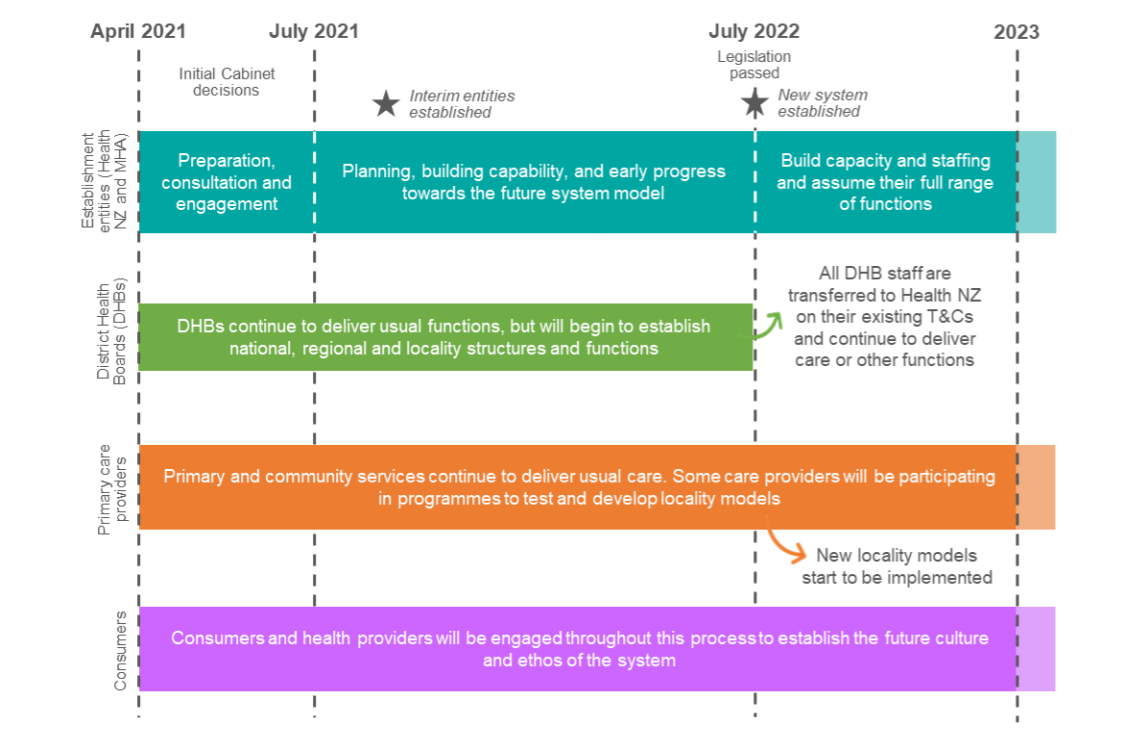As has been anticipated for some time, the Government announced fundamental changes to the health system this morning. The headline decision is that all District Health Boards (DHBs) will be replaced with one national organisation, Health NZ – a Crown Entity.
The announcement marks the first phase in the Government's response to the recommendations set out in the Health and Disability System Review (Review) report, which was commissioned by the Government in 2018 and chaired by Heather Simpson. The final report was published in mid-2020, and is available here. Since then, the Transition Unit (within the Department of the Prime Minister and Cabinet) has been advising the Government on its response.
The overarching objectives of the reform are to simplify the system, and to achieve consistency and equity of service and outcomes across New Zealand, for all ethnicities. Put simply, the Government says that "who you are or where you live should not determine the range and quality of services you receive".
The design of the new sector will pay particular attention to achieving better health outcomes for Māori, recognising the Government's obligations under Te Tiriti o Waitangi, and the need to take a "very different" approach to supporting hauora Māori. The Government hopes to build on the success of the Māori-led adult influenza vaccination campaigns in 2020, by introducing a much greater role for iwi and Māori in shaping service design and provision for Māori communities.
In some respects, the Government's proposal goes further than the recommendations set out in the Review. For example, the review recommended that DHBs be consolidated from 20 to 8-10, but did not indicate that they be outright replaced. It also proposes a more ambitious timeframe for reform.
Key features of the proposed restructure include:
- A new Crown Entity, Health NZ will:
- replace all 20 DHBs, and become responsible for their contracts and their employees;
- have four regional divisions;
- be responsible for the day-to-day running of the health system.
- A new Māori Health Authority will have joint decision-making rights to agree national strategies, policies and plans, and will be empowered to directly fund innovative health services targeted at Māori.
- The Ministry of Health will be given strengthened responsibility to focus on "stewardship" of the reformed sector, and will continue to serve as advisors to the Government.
- A new Public Health Agency will be established (likely a Departmental Agency hosted within the Ministry of Health) to provide technical expertise and leadership on public health policy, strategy and intelligence. Such an Agency was not recommended by the Review, but was a commitment made in the Labour Party manifesto prior to the 2020 election.
The Government's White Paper (available here) provides a diagram of the new structure:

The application of the Crown Entities Act 2004 to Health NZ would empower the Minister and the "Monitoring Department" to have oversight over Health NZ (via appointments to the Board, and the setting and reviewing of performance expectations). This is intended to give the Minister a stronger and more direct relationship with Health NZ compared to the more indirect relationship with DHBs.
Legislation will be required to implement the reform. The Government intends that:
- An interim Health NZ organisation will be established in late 2021.
- Legislation to formally establish Health NZ and the Māori Health Authority will be passed "around mid-2022".

Policy changes and announcements are still expected in areas such as funding, workforce, disability support services, and digital health.
More information can be found in the Ministers' press release (available here) and the DPMC's webpage dedicated to "the new health system" (available here).
The Government has advised that there will be many opportunities to contribute to detailed design in future. We will keep you updated as things progress.



